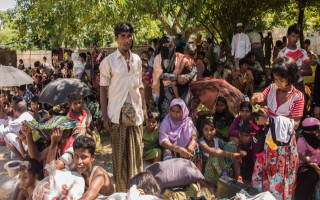SOCIAL FORESTRY Rohingyas put beneficiaries in trouble
Several thousand beneficiaries of social forestry are faced with losses as Rohingyas have continued erecting shelters and collecting firewood, destroying forests spanning about 3,000 acres in Cox’s Bazar.
A top divisional forest official in Cox’s Bazar (south) said that social forests on at least 3,000 acres were completely destroyed by the Rohingyas entering Bangladesh fleeing ethnic cleansing in Rakhine State of Myanmar. About 3,000 beneficiaries of social forestry lost their trees and incurred losses due to deforestation caused by the Rohingyas.
According to the existing social forestry regulation, each beneficiary can plant and rear one acre of forest for 10 years, before cutting the trees. The social forestry programme aimed at improving the environment and ensuring self-reliance
for host communities.
Rohingyas said that they were compelled to fell trees as there designated camps were on the forest lands and they were facing acute shortage of cooking fuel.
Department of Forests officials in Cox’s Bazar said that over all forests on about 4,000 acres of land in Cox’s Bazar had been put on the verge of extinction, since August 25 when the Rohingya infux began.
They said that there were 1,000 trees on an average on each acre of the forests consisting different species of trees, including Akashmani, Karai and Rain Tree.
‘About 3,000 acres of the 4,000 acre forests destroyed so far were under social forestry,’ said assistant conservator of forest in Cox’s Bazar (south) Dewan Md Abdul Hye Azad.
‘Rohingyas destroyed forest trees worth about Tk 329 crore for erecting makeshift shelters and collecting wood for fuel and at least 50 per cent of them were from social afforestation programme,’ he said.
Two beneficiaries Nurul Absar and Badiur Rahman Sikdar, also leaders of their respective groups, said that as the Rohingyas destroyed social forests, each beneficiary incurred a loss of Tk 4-6 lakh.
They demanded compensation.
According to the UN estimation till Tuesday, 6,22,000 Rohingyas entered Bangladesh since the beginning of the ongoing influx, what the United Nations called the world’s fastest-developing refugee emergency, on August 25.
A government handout on Monday, however, said that 6,30,800 Rohingyas entered Bangladesh till date.
Officials estimated that the new influx already took to 10.41 lakh the number of documented and undocumented Myanmar nationals in Bangladesh entering the country fleeing persecution at times since 1978.
The new influx began after Myanmar security forces responded to Arakan Rohingya Salvation Army’s reported attacks on August 25 by launching violence what the United Nations denounced as ethnic cleansing.
Terrified, half-starved and exhausted, Rohingyas continued arriving in Bangladesh trekking through hills and forests and crossing rough sea and the Naf on boat and taking shelter wherever they could in Cox’s Bazar mostly on forest lands.
‘We allowed them to erect shelter on humanitarian ground. But never thought that it would be reason of such a loss for us,’ said Nurul Absar, who led 100 beneficiaries of social forestry on 100 acre lands.
According to the existing social forestry regulation, 1,000 trees are planted per acre in the area and trees are supposed to be harvested after 10 years. Of the 10 years, after four years of plantation, 50 per cent of the trees are to be thinned out, after another three years remaining trees are to be thinned out. Finally, after 10 years, the remaining trees are to be harvested.
After 10 years, 45 per cent of the earning from the trees goes to the beneficiaries, another 45 per cent to the Department of Forests and the rest 10 per cent is to be kept for the next phase plantation cost.
The intermediate thinning provides return to the beneficiaries and those are mostly used as firewood.
Badiur Rahman Sikdar, who led 13 beneficiaries, said that first thinning of their social forests was due this year. ‘We have demanded compensation from the government over two months ago,’ he said.
‘We are yet to hear anything from the authority,’ he added.
‘Some beneficiaries have demanded compensation and we are working on the issue,’ said Dewan Md Abdul Hye Azad.
A meeting of parliamentary standing committee on forest and environment ministry in parliament complex on October 10 was informed that Rohingyas destroyed forest trees worth Tk 151 crore for erecting makeshift shelters and collecting firewood.
During the first week of October, the Department of Forests officials in Cox’s Bazar estimated that 2,500 acres of forests had been used for making makeshift shelters and collecting firewood.
Supported by the United Nations World Food Programme, Save the Children has begun distributing food to newly arrived Rohingyas, many of them malnourished, said a statement on Tuesday.
A new survey – by WFP, Save the Children, UNICEF, UNHCR and Action Contre la Faim – points to alarming rates of malnutrition in Kutupalong refugee camp, with as many as one in four children affected.
‘This food distribution programme should help prevent children, and pregnant and lactating women in Kutapalong from slipping into acute malnutrition’ said Save the Children director Mark O’Hora.
The partnership will see more than 3,47,000 people receiving food parcels through a general food distribution, and the support of more than 68,700 children and pregnant and lactating women through a supplementary feeding programme.
News Courtesy: www.newagebd.net











